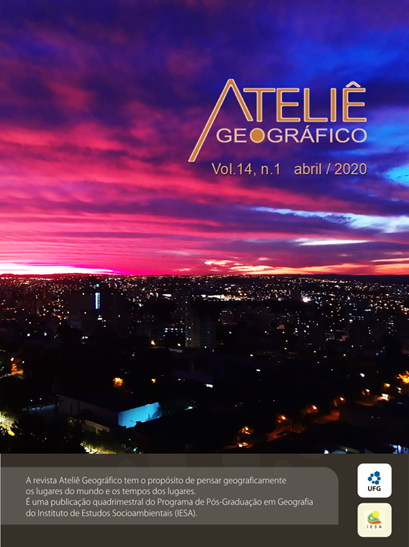Transição urbana e demográfica no Brasil: características, percursos e tendências
DOI:
https://doi.org/10.5216/ag.v14i1.59464Resumo
Este estudo tem como objetivo analisar a evolução conjunta dos processos de transição urbana e demográfica vivenciados pelo Brasil e Unidades Administrativas, de 1940 a 2010. O trabalho contém a caracterização espaço-temporal dos processos, o agrupamento das unidades com características semelhantes, a identificação de modelos de trajetórias e a projeção de tendências. Para o estudo foram aplicados métodos de análise de dados, de classificação hierárquica e de estimativa aos dados produzidos por fontes oficiais. A evolução dos processos apresenta as tendências clássicas que marcam as fases das transformações demográficas: aceleração do crescimento demográfico e da urbanização decorrentes inicialmente das mudanças do comportamento da mortalidade, a seguir, pela intensificação da migração rural-urbana, evoluindo para a fase de redução sincrônica da fecundidade e das taxas de crescimento natural ou vegetativo, migratório e urbano. As trajetórias dos processos demográficos, passadas ou atuais, refletem as desigualdades socioespaciais existentes entre as regiões do país e mostram que as diferenças entre indicadores persistem, porém com tendência à convergência.
Palavras-chave: Transição urbana, Transição demográfica, Migração rural-urbana, Continuidade e convergência.
Downloads
Downloads
Publicado
Como Citar
Edição
Seção
Licença
Autores que publicam nesta revista concordam com os seguintes termos:- Autores mantém os direitos autorais e concedem à revista o direito de primeira publicação, com o trabalho simultaneamente licenciado sob a Licença Creative Commons Attribution que permite o compartilhamento do trabalho com reconhecimento da autoria e publicação inicial nesta revista.
- Os autores não serão remunerados pela publicação de trabalhos na Revista Ateliê Geográfico. Além disso, os conteúdos publicados são de inteira e exclusiva responsabilidade de seus autores, ainda que reservado aos editores o direito de proceder a ajustes textuais e de adequação às normas da publicação.
- Autores têm permissão e são estimulados a divulgar seu trabalho online (ex.: em repositórios institucionais ou na sua página pessoal), já que isso pode gerar alterações produtivas, bem como aumentar o impacto e a citação do trabalho publicado (Veja O Efeito do Acesso Livre).


